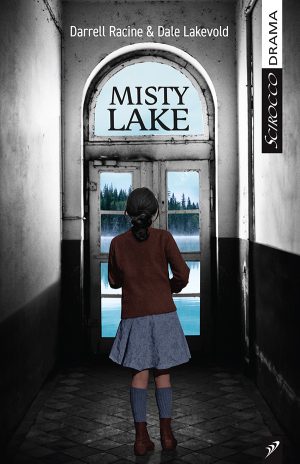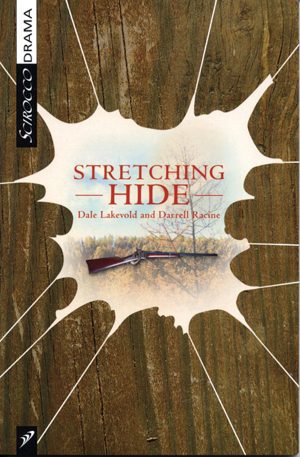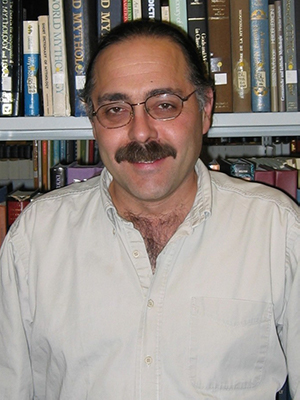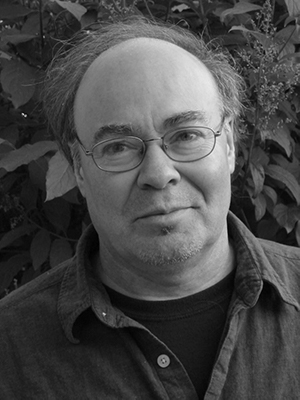Posted June 14, 2024
The Interview – Darrell Racine and Dale Lakevold
Darrell Racine
Darrell Racine is a graduate of Harvard, Cambridge, and Oxford. He is a Metis from the Turtle Mountains in Southwestern Manitoba and lives in Brandon. Racine’s plays include Stretching Hide and Misty Lake, both co-authored with Dale Lakevold. Darrell Racine teaches in the Department of Native Studies at Brandon University.
Dale Lakevold
Dale Lakevold‘s plays include Wild Geese, Cross Creek, L-Love’s Body, Never Never Mind, Kurt Kurt Cobain, Misty Lake, and Making L-Love’s Body. His audio theatre installation “Notes for a Speech on (Canadian) Flagmaking” was produced at the Art Gallery of Southwestern Manitoba in 2003 by the Brandon Arts Collective. He was nominated for the John Hirsch Award for Most Promising Writer in Manitoba in 1999. He lives in Brandon where he teaches at Brandon University.
Darrell and Dale, the two of you have co-authored several plays, including Stretching Hide and Misty Lake, both of which are published by Scirocco Drama. How did you decide to team up, and what was the first work that you collaborated on?
Darrell: We first started working together on Misty Lake; I had gone up north and done an interview with my friend Elizabeth Samuel. And I remember coming back and then wondering what I was going to do with this interview. So I took it to Dale and I said, “Dale, what do you think we could do with this?” And Dale said, “I think this is a play.” And so that’s how we got started. So we sat down together and got to work.
Dale: We did have a bit of a detour, too, because at one point we thought it could be a documentary, so we spent a good part of a year actually working with a film producer out of Winnipeg. Darrell had six hours of material, and there is a documentary aspect to it, in the sense that the character of Patty is a journalist who is attempting to write a story for a radio audience.
I hadn’t realized that Misty Lake was your first collaboration! My follow-up question to that is: What are the advantages of writing as a team? And then following that up, are there any disadvantages?
Darrell: I think that we would interpret the advantages differently, as well as the disadvantages differently. In the end, it all works. The advantage for me—I don’t know if this is trivial, but the advantage to me is that I don’t have to do any of the actual editing and writing-writing. I get the story, or part of the story, in my head. And Dale and I meet and he comes back the next day with typed-out pages. So, for me, you know…
Magic.
Darrell: Magic. Exactly. He comes back with typed-out pages. So for me, once we’re done with our meeting, in a sense, I’m released. And then Dale has to go home and slog all night.
Dale: You know, Darrell is minimizing his involvement in the editing process, because when I come back with those pages, then we hash and rehash them and go through them again very carefully. But by the end, we have a script that we both essentially can sign off on; we’ve gone through it line by line, word by word. Yeah, it’s an interesting process. I’m always amazed at Darrell’s storytelling abilities because, I can just say, for instance, “You know, Darrell, I think we need a story here.” And then he’ll say, “Okay, give me a minute.” And he’ll close his eyes; he’ll lean back in his chair, and then he’ll come up with some material. You know, I don’t know where it comes from, but…
Darrell: Dale accuses me of being a confirmed liar sometimes.
I don’t know…that also sounds like magic!
Dale: Yes. That’s right. With Misty Lake, it was a little bit different because we did have the transcript and verbatim material. And, you know, it’s a composite script in that sense because it is based on Elizabeth’s words and also on Augustine, too, right, Darrell? Augustine was Darrell’s friend from up north in Lac Brochet.
Are there any disadvantages to writing as a team that you can think of?
Darrell: Well.
Dale: Darrell gets annoyed with me from time to time.
Darrell: Yeah, less and less, over the years. I think it was a lot more difficult earlier on. Because, you know, sometimes Dale would be wanting to go in a certain direction or wanting a certain idea. And I couldn’t figure it out for the life of me, and I couldn’t get him to explain. And so it became somewhat frustrating, but that seems to have lessened as time goes on. As we understood how the other person was thinking about the story, it’s gotten easier. I would also say finding the right time to write is a challenge. I’m a morning person; I get up at about five a.m. and I go to bed at ten. Dale gets up at, you know, ten, eleven, twelve, and then goes to bed at two. And so when are we both at an optimum? And it turns out that it’s probably between two and five, and so all of our plays have been written between two and five.
It’s like you’re in different time zones.
Dale: When we work, we work. The other thing is, we used to work all over the place in many different places, like different cafés and so on and so forth. But for our more recent work, we’re actually meeting at Darrell’s place, which is quite comfortable and sometimes if we get on a roll, Darrell will make supper, and then we’ll take a break. Darrell’s a really good cook, so that’s one of the advantages. I get a good meal and then we go for another hour or so after we have a bite to eat.
Ideal.
Darrell: Yeah.
Dale: It is really. And then he kicks me out.
I’d like to go back to Misty Lake for a minute. You know, we’ve just brought out a new edition of Misty Lake. When was it first published?
Dale: Well, it was back around 2000, I guess. Harry Rintoul started up a little publishing company called Adler and Ring. I don’t know if you remember that, but he published Misty Lake as his first play.
So we’re nearly a quarter of a century later, and the play is still in demand; we’ve just brought out the new edition. Any thoughts about why the play has such longevity and has had such resonance with audiences and readers?
Darrell: Well, of course, there’s a universal story in there about suffering, and I’ve included a little essay on that. So I think that that would be part of it. The second thing is that, even though the play talks about direct abuse at residential schools, it also explores the subject of intergenerational trauma, that even the later generations are still going through the same experiences. I think that that’s one of the reasons it still resonates. There’s that general human element about suffering and how we suffer and why we suffer. And then there’s the intergenerational aspect that still speaks to an Indigenous audience—and also speaks to a mainstream audience in the sense that a lot of non-Indigenous Canadians are still trying to understand. They’re still trying to understand what exactly happened at residential schools, and why there has to be reconciliation.
When I read Misty Lake I was astonished at how early on you were talking about intergenerational trauma. It’s something that has come to the fore in recent years, but you were addressing that issue twenty-five years ago.
Darrell: Well, I mean, I’m a Native Studies professor, so, you know, when the literature came, when people were first talking about it, I became interested in it. As you know, I went to the Guy Hill Residential School reunion, and saw everything first-hand; I was in on those conversations. We started talking about it early on because Indigenous people were talking about it very early on.
The rest of us are just catching up.
Darrell: I mean, I think a lot of people have caught up, but at the time, it was less well-known by the dominant society.
When we’re speaking about the play here, it sounds like it explores such a heavy topic—and it is a heavy topic, but the story in Misty Lake is told so beautifully, with moments of humor and lightness.
Darrell: The humor part is very important in the sense that if you’re going to deal with traumatic situations, a reader or audience can only handle that for a particular length of time. And unless those lighter pieces are in there… You can see the same pattern in Tomson Highway’s works in the sense that there’s this trauma, trauma, trauma, but then there are these funny scenes. I think one of the only ways you can actually deal with it is to have humor in there so that the reader and/or audience is not being hit and hit again. It allows the reader or the audience to consume that which, for the most part, they’d otherwise be unable to consume.
Darrell, you mentioned being a professor. You both teach at Brandon University. Can you speak to how writing informs your teaching practice or how teaching informs your writing practice? Or both?
Dale: I spent I spent ten years slogging away as a sessional part-time instructor. And I taught up north; I used to fly into reserve communities every two weeks for two or three days. So I got a taste of some of the context that came through in Misty Lake. But for me, I teach English and creative writing, and what better world is there for a writer than to be working with the works of other writers and to be working with student writers? And so for me, it just all feeds into the work itself. So I’m really grateful for that experience. And of course, you’re also with colleagues who can inspire you—you know, like Darrell! We were both sessionals for a while there, and got to know each other right at the start of our teaching careers.
Darrell, what about you?
Darrell: Well, I mean, my father was a storyteller, and I mean, generic stories, but he could tell a good story. And I always loved listening to those stories. And by the time I was about sixteen or seventeen or maybe a little bit older, I started to see patterns and I started to understand that the stories changed depending on the audience. There would be these things that you would notice in his storytelling. I remember one time—and just to show you how it’s kind of a community thing—I was telling my cousin, “Oh, you know, there’s this story and stuff, you know, blah, blah, blah, blah, blah, blah.” And they went, “Oh yeah, yeah, yeah, yeah. My dad told me that story.” But the thing is, that when my cousin’s father had told him the story, he was the main character. And when my dad told the story, he was the main character. You see what I mean? So, I started to understand that stories depend on the audience; they’re changed for the circumstance. And then I became intrigued with that. I like that idea of storytelling.
I think that the additional component was that my father was an alcoholic. He was violent, you know, so there was all this trauma in my childhood. And then, as you start teaching Native Studies, a lot of the students have different trauma. And so it’s related to addressing that trauma, and the question of how do we deal with that trauma? I taught courses like Native Health Issues, where much of the emphasis was on mental health. So the necessity of making sure you get those stories out, and then thinking about how you get those stories out, and how do you heal from trauma? For me, the storytelling comes first, and then you can work with trauma. One of the main points that comes out of Misty Lake is in Mary’s line about how healing begins when you can talk about your life. Healing is related very closely to storytelling and narrative and attempting to make sense of your life.
Elizabeth Samuel, who the play is based on, really consolidated a lot of how I saw what was going on at the time. That made it easier to put it all together.
Can you give us a sneak peek of what you’re working on now?
Dale: We had a burst of creative energy during Covid. Darrell was on leave and I was on sabbatical, and we pumped out three scripts over a period of two years or so. We’re also collaborating with someone who has a research project on the subject of our own plays.
We’re going to go ahead and self-produce a play called Owl Calling. It’s coming up in Winnipeg in September. We’re just in the process right now of making that happen.
And we’ve had readings; the Manitoba Association of Playwrights has been helping us with readings and workshops, too. You know, there’s such a strong theatre community in Winnipeg, and we’re tapping into that. And Darrell has a screenplay that he wrote a while back, and we’re just talking about the possibility of writing a novel from that screenplay, possibly a young adult novel.
Darrell: We want to create a seven-part series. So we’ve got Misty Lake, Stretching Hide, Owl Calling, a 60s Scoop play, and we have what we call the Franklin play. So we’ve got a couple more left to do before we’re done the series. So we have an idea of what we’re going to cover and we have a larger plan. So we’ll see how far we get, but we’re on our way.
No new ideas for plays yet, but usually that comes about by something happening or, you know, getting upset about something that people aren’t seeing something correctly and/or paying attention to. And then we talk about it and we say, “Someone’s got to write about this, someone has to work on this!” And that’s how we’ll move forward, as things pop up and we see issues that need to be tackled.
Dale: Our Franklin play goes back to the 1860s; it’s based on Darrell’s research at Oxford and it’s about a Métis lawyer who was living in London who became involved in the search for the lost Franklin expedition. And he got to know Lady Franklin. He was from Manitoba. Do you know the Isbister Building at the University of Manitoba? The historical figure is actually Alexander Isbister. So there is one Métis character surrounded by all these Brits, you know. So that fits into our sequence or cycle of plays on Indigenous culture and history.
Thank you guys so much; this is great. If there’s anything that I haven’t asked you about, though, that you want to tell me about feel free to jump in.
Dale: Well, we want to thank Scirocco for publishing Misty Lake and bringing it, you know, to a wider audience.
Darrell: And we’re grateful to Elizabeth Samuel. Without her, this play would not exist; it is her life and she was brave enough to tell that kind of story in such detail. I really believe that she was doing it for her kids and for her family. The play reverberates across the Indigenous community. So if it wasn’t for Elizabeth Samuel, then maybe Dale and I would never have got started.
Dale: That’s right.
Well, I think that’s a beautiful note to end on. Thanks for this.
-
 Misty Lake$17.95
Misty Lake$17.95 -
 Stretching Hide$14.95
Stretching Hide$14.95


